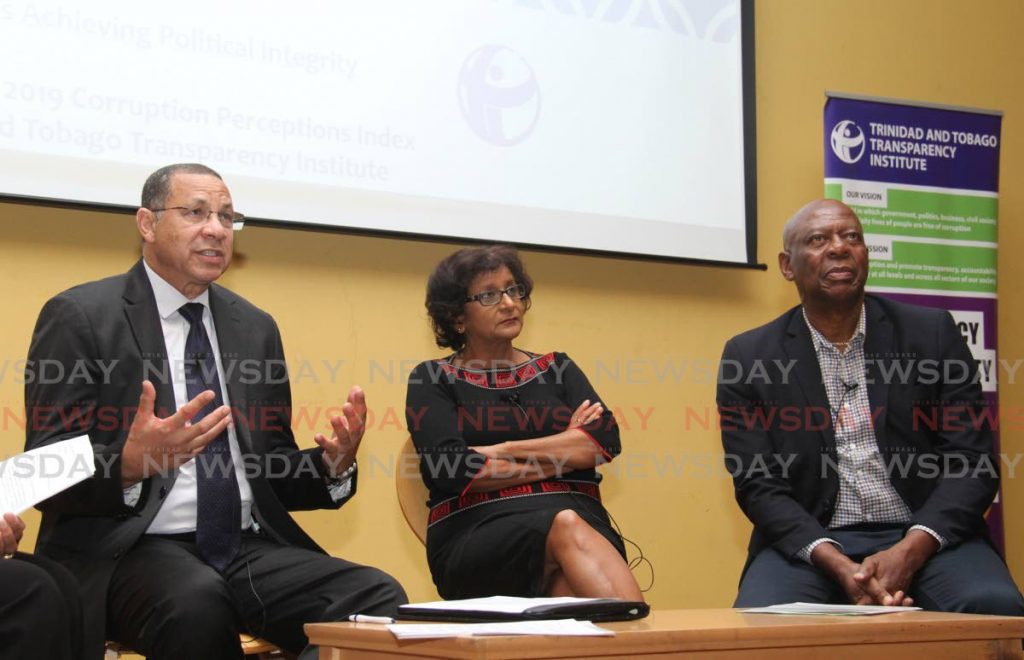[UPDATED] TT’s global corruption index drops six ranks

TT has dropped one point in the Transparency International 2019 Corruption Perceptions Index, from 41 in 2018 to 40 in 2019. This country now ranks at 84 from 78 in 2018. The index ranks 180 countries and territories by their perceived levels of public sector corruption, according to experts and business people. It uses a scale of zero to 100, where zero is highly corrupt and 100 is very clean. More than two-thirds of countries scored below 50 on this year’s CPI, with an average score of just 43. Similar to previous years, the data showed that despite some progress, a majority of countries were still failing to tackle public sector corruption effectively.
Chairman of TT Transparency International (TTTI) Dion Abdool said while the TT rating may seem an insignificant figure, it does seem to be a downward trend. TT scored an average of 40 points out of 100.
“TT has not moved from where we were,” Abdool said at the launch of the 2019 CPI at the Arthur Lok Jack Graduate School of Business, Mt Hope, on Thursday.
Reacting to the latest TT picture, UNC deputy political leader David Lee said over the last four years under the PNM-led government, the country’s rankings have been going downwards as far as corruption is concerned.
“It is not improving, it is getting worse. The ease of doing business has slipped since this Rowley administration has come into office. It is not surprising because, since the Rowley administration, the Opposition has been calling for the procurement legislation to be proclaimed and put in place. We have a regulator that is place but other than that, nothing else.
“He has no staffing, no regulations that he had sent to the Minister of Finance since September, last year, so the Opposition is not surprised by the slippage in the Corruption Index.”
Leader of the MSJ David Abdulah said the rating was a description of our reality.
“The procurement legislation has not been fully proclaimed and implemented. The government is pussyfooting with respect to the regulations, backtracking on some of the provisions that have already been made law.”
Abdulah said they should make sure that procurement legislation included government-to-government arrangements, which was just one issue. He said there was a lack of accountability and approvals for expenditure.
“All these things are indicators of corruption and it is not only the public sector or government operations because it relates to the private sector as well. Private sector people are known to pay kickbacks and favours, so it is a reflection of our reality.”
He said neither the PNM nor the UNC has been able to implement policies and other laws to bring that into effect to ensure proper transparency and accountability. On the other hand, he said Guyana, also with a score of 40 from 37 in 2018, was a significant improvement on the CPI since 2012. He said while there was still much work to be done, that government was demonstrating political will to hold former politicians accountable for the misuse of state resources.
In the 2019 report, Delia Ferreira Rubio, chair of Transparency International, said: “Governments must urgently address the corrupting role of big money in political party financing and the undue influence it exerts on our political systems.”
The analysis showed corruption was more pervasive in countries where big money can flow freely into electoral campaigns and where governments listened only to the voices of wealthy or well-connected individuals.
Other countries in the Caribbean which were ranked were Dominica (55 points) ranked at 48; Barbados (62 points) ranked at 30; St Lucia (55 points) ranked at 48; Grenada (53 points) ranked at 51; Cuba (48) ranked at 60; Jamaica (43) ranked at 74 and Dominican Republic (28 points) ranked at 137.
This story was originally published with the title "TT falls seven spots on 2019 Corruption Perception Index" and has been adjusted to include additional details. See original post below.
TT has dropped seven spots on Transparency International's Corruption Perception Index (CPI), to 85 out of 180 in 2019 from 78 out of 180 countries in 2018. The country also lost one point in its overall score, from 41 out of 100 in 2018, to 40 out of 100 in 2019.
Chairman of TT Transparency International (TTTI), Dion Abdool, said while this may seem an insignificant figure, it does seem to be a downward trend.
"TT has not moved from where we were," Abdool said at the 2019 CPI launch Thursday at the Arthur Lok Jack Graduate School of Business, Mt Hope.
On the other hand, he said Guyana, also with a score of 40, was a significant improvement on the CPI since 2012. Last year the South American country ranked 93 but this year, moved to 85, tied with TT. Abdool said while there was still much work to do, the TT government was demonstrating political will to hold former politicians accountable for the misuse of state resources.
The index ranks 180 countries and territories by their perceived levels of public sector corruption, according to experts and business people. It uses a scoring scale of zero to 100, where zero is highly corrupt and 100 is very clean. More than two-thirds of countries scored below 50 on this year’s CPI, with an average score of just 43. Similar to previous years, the data showed that despite some progress, a majority of countries were still failing to tackle public sector corruption effectively. New Zealand and Denmark were tied for first place as the countries with the lowest peception of public sector corruption, with an overall score of 87.

Comments
"[UPDATED] TT’s global corruption index drops six ranks"